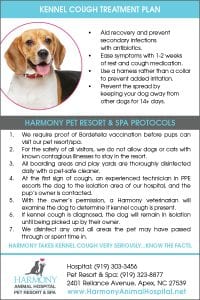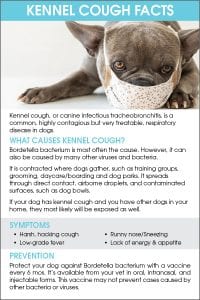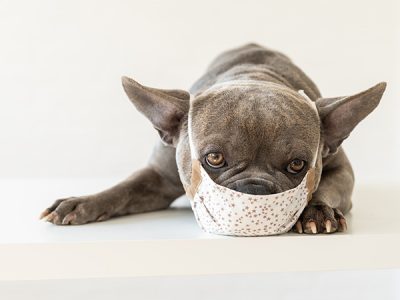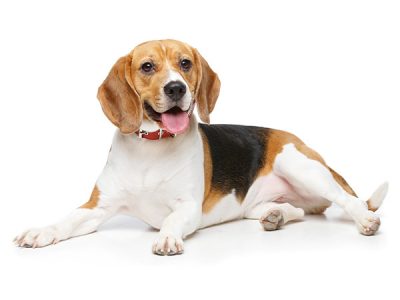Causes, Symptoms, Treatment, & Prevention of this Canine Respiratory Infection
Much like a common cold in humans, kennel cough (AKA canine infectious tracheobronchitis) is caused by an airborne virus. It causes the trachea and bronchi to become inflamed making for a potentially congested and coughing pup, hence the name.
This fairly common and highly contagious upper respiratory infection is spread through airborne droplets, direct contact (e.g. touching noses), and/or contaminated surfaces including shared food and water bowls.
If your dog is frequently boarded, goes to doggie day care, a grooming salon or is otherwise exposed to groups of dogs, he or she may be at risk of getting kennel cough. Trips to dog parks, training classes, and pet stores, are also places where your dog can become infected.
“Kennel cough can be picked up anywhere, even if a dog has a current vaccine to protect it,” said Dr. Jodi Reed, DVM. “All our boarders at Harmony are required to have a current kennel cough vaccine, but just like the flu shot in humans, the kennel cough vaccine is not always 100% effective in preventing it.”
Bordetella Bronchiseptica is a highly communicable bacterium that is the primary cause of kennel cough, leading to severe fits of coughing, whooping, vomiting, and, in very rare cases, seizures and death. The infection is highly contagious and can be more severe among unvaccinated dogs, already sick dogs with poor immune systems, senior dogs, and puppies under six-months old. Thankfully, it’s easily treatable in most dogs.

 Know the Symptoms of Kennel Cough
Know the Symptoms of Kennel Cough
- Strong cough, often with a “honking” sound (most obvious symptom)
- Runny nose
- Sneezing
- Lethargy
- Loss of appetite
- Low-grade fever
While these symptoms may indicate kennel cough, other diseases and viruses can have similar symptoms as well. It’s best to keep track of any symptoms and abnormal behaviors when your dog isn’t feeling well, as they may be clues to help your vet diagnose your animal.
Symptoms of kennel cough usually begin 3-10 days after exposure. If your dog is exhibiting any of these kennel cough symptoms, keep them away from other dogs, including daycare and boarding, for at least 14 days. This is generally how long it takes to completely shed the virus from their system. If you have multiple pets and one shows signs of a cough, then assume all dogs in the home have been exposed whether or not they show symptoms.
How to Treat of Kennel Cough
Mild cases of kennel cough are treated with cough medicine to ease the symptoms and a week or two of rest, while keeping your pet away from other dogs. Humidifiers can help as well if your dog has excessive coughing. Your veterinarian might also prescribe antibiotics to prevent a secondary infection.
As always, make sure your dog has plenty of fresh water available. Proper hydration, good nutrition, and of course, extra love and belly rubs make a big difference in helping them get well.
If it is determined that your pup has kennel cough, use a harness rather than a collar when you go for a walk to prevent additional irritation to the trachea. Keep your dog away from other dogs for at least 14 days until they shed the virus from their system and are no longer contagious.
 How to Prevent Kennel Cough
How to Prevent Kennel Cough
The vaccine, Bordetella bronchiseptica, is available for the Bordetella bacterium, which is the most common agent to cause kennel cough. The vaccine is available in oral, intranasal, and injectable forms. Depending on the form, it’s usually initially given in two doses, two to four weeks apart, followed by a booster every six months.
This vaccine helps protect against a wide variety of respiratory infections often grouped together and called “kennel cough.” Although most cases of kennel cough are caused by Bordetella, some are caused by other agents, such as the canine parainfluenza virus and canine respiratory coronavirus, so the vaccine may not prevent your dog from catching the disease.
While it may not always be 100% effective, this vaccine is still the best protection available for your dog and will lessen the severity of any symptoms. Bottom line, having your dog’s kennel cough vaccinations up to date is important because it will protect your dog against the most common strains out there and potentially giving them partial protection against some of the newly mutated strains.
Though kennel cough may be common and unpleasant for your pet, it should ease your mind that the infection can usually be treated in a short time, and in most cases, prevented altogether.
Harmony requires proof of this vaccination before allowing dogs to board with us in order to help prevent the spread of this disease.
Your pet’s health is our number one concern. If you would like more information on kennel cough, or to schedule an appointment for a vaccine, please give us a call at: 919.303.3456



